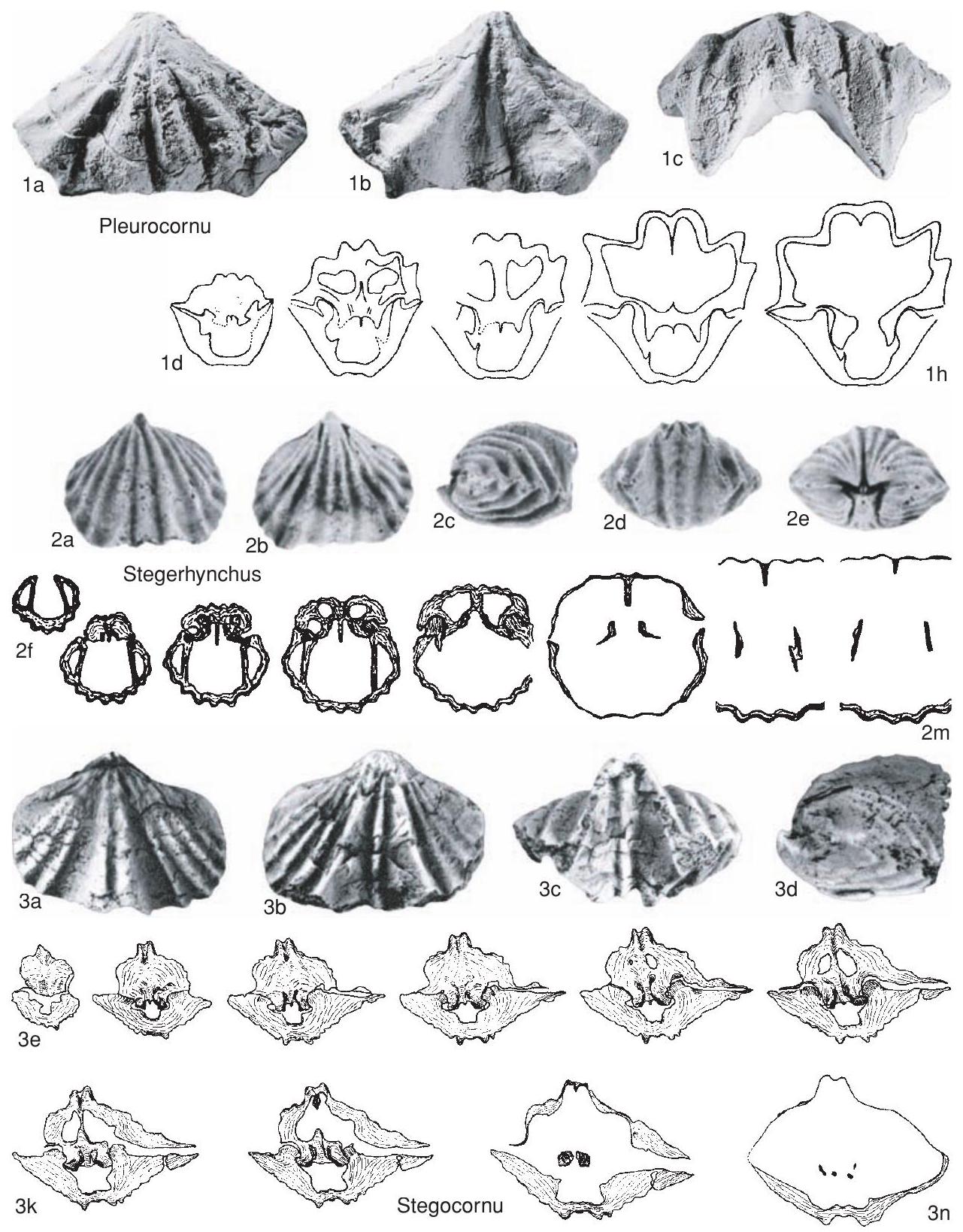Welcome to the Treatise on Invertebrate Paleontology!
Please enter a genera name to retrieve more information.

Stegerhynchus
Classification
Phylum:
Brachiopoda
Subphylum:
Rhynchonelliformea
Class:
Rhynchonellata
Order:
Rhynchonellida
Superfamily:
Rhynchotrematoidea
Family:
Rhynchotrematidae
Subfamily:
Rhynchotrematinae
Formal Genus Name and Reference:
Stegerhynchus FOERSTE, 1909a, p. 96
Type Species:
Rhynchonella (Stegerhynchus) whitii-praecursor Foerste, 1909a, p. 96, OD, =Stegerhynchus praecursor FOERSTE, 1909a, p. 96
Images
(Click to enlarge in a new window)
Fig. 708, 2a-m. *S. praecursor (Foerste), ae, topotype, dorsal, ventral, lateral, anterior, and posterior views, lower Silurian, Clinton Beds, Clifton, Tennessee, USA, collected by Foerste, x2.4 (Jones, 1981), f-m, hypotype, serial sections 0.3, 0.6, 0.7, 0.9, 1.0, 1.3, 1.9, 2.0 ~mm from posterior, lower Silurian, Bescie Formation, Anticosti Island, Canada, x7 (Jin, 1989).
Synonyms
Stegorhynchella, Tungussotoechia, Stegerhynchops
Geographic Distribution
North America, Europe, Siberia, Altai, Mongolia, Australia
Age Range
Beginning Stage in Treatise Usage:
lower Silurian (Llandovery)
Beginning International Stage:
Rhuddanian
Fraction Up In Beginning Stage:
0
Beginning Date:
443.07
Ending Stage in Treatise Usage:
upper Silurian (Ludlow)
Ending International Stage:
Ludfordian
Fraction Up In Ending Stage:
100
Ending Date:
422.73
Description
Subtriangular to subpentagonal outline and dorsibiconvex profile, Beak erect to suberect, delthyrium open or with rudimentary deltidial plates, Fold and sulcus narrow, strong, from umbones, anterior commissure uniplicate, trapezoid, serrate, Costae simple, subangular, from beaks, Dental plates short, subvertical, sometimes obscured by callus, Hinge plates thick, short, septalium small, with short septalial plates, dorsal median septum thick, long, cardinal process septiform, crural bases arising from septalial plates, crura laterally flattened, ventrally curved
References
Museum or Author Information
Classification
Phylum:
Brachiopoda
Subphylum:
Rhynchonelliformea
Class:
Rhynchonellata
Order:
Rhynchonellida
Superfamily:
Rhynchotrematoidea
Family:
Rhynchotrematidae
Subfamily:
Rhynchotrematinae
Formal Genus Name and Reference:
Stegerhynchus FOERSTE, 1909a, p. 96
Type Species:
Rhynchonella (Stegerhynchus) whitii-praecursor Foerste, 1909a, p. 96, OD, =Stegerhynchus praecursor FOERSTE, 1909a, p. 96
Images
(Click to enlarge in a new window)
Fig. 708, 2a-m. *S. praecursor (Foerste), ae, topotype, dorsal, ventral, lateral, anterior, and posterior views, lower Silurian, Clinton Beds, Clifton, Tennessee, USA, collected by Foerste, x2.4 (Jones, 1981), f-m, hypotype, serial sections 0.3, 0.6, 0.7, 0.9, 1.0, 1.3, 1.9, 2.0 ~mm from posterior, lower Silurian, Bescie Formation, Anticosti Island, Canada, x7 (Jin, 1989).
Synonyms
Stegorhynchella, Tungussotoechia, Stegerhynchops
Geographic Distribution
North America, Europe, Siberia, Altai, Mongolia, Australia
Age Range
Beginning Stage in Treatise Usage:
lower Silurian (Llandovery)
Beginning International Stage:
Rhuddanian
Fraction Up In Beginning Stage:
0
Beginning Date:
443.07
Ending Stage in Treatise Usage:
upper Silurian (Ludlow)
Ending International Stage:
Ludfordian
Fraction Up In Ending Stage:
100
Ending Date:
422.73
Description
Subtriangular to subpentagonal outline and dorsibiconvex profile, Beak erect to suberect, delthyrium open or with rudimentary deltidial plates, Fold and sulcus narrow, strong, from umbones, anterior commissure uniplicate, trapezoid, serrate, Costae simple, subangular, from beaks, Dental plates short, subvertical, sometimes obscured by callus, Hinge plates thick, short, septalium small, with short septalial plates, dorsal median septum thick, long, cardinal process septiform, crural bases arising from septalial plates, crura laterally flattened, ventrally curved
